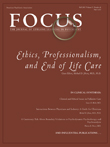Interactions Between Physicians and Industry: A Guide for Clinicians
Abstract
Physicians and the pharmaceutical industry share a convergence of interest in providing safe and effective medications to patients, but differ in their practices and ethical standards. Interactions between them are inevitable and desirable, but may create conflicts of interest for physicians. Marketing and medical education are fundamentally different and must not be confused with one another. Studies show that marketing affects physician practice, that information from industry is biased in favor of the manufacturer, and that physicians are not skilled in identifying the impact of marketing on their clinical decisions. Self-serving bias is pervasive in these interactions and is particularly difficult to detect in oneself. Guidelines regarding gifts are based on studies demonstrating their impact and generally recommend that they be limited or avoided altogether. Free samples may be of benefit to patients, but must be used with caution to avoid inappropriate drug choice. Contract services, such as research or speakers bureaus, require strict conformity to ethical and regulatory standards. Disclosure, peer review, adherence to policies and guidelines, and frank self-examination are essential to ensure the objectivity of physicians engaged in clinical care, research, and teaching.



